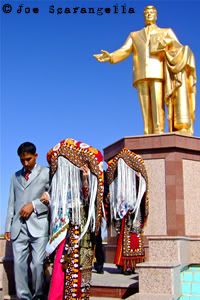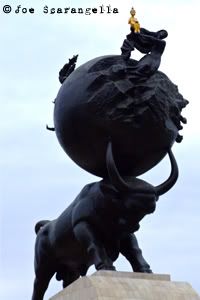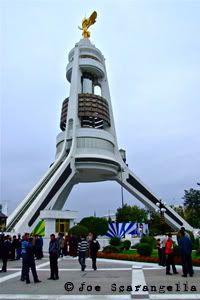by Joe
CLICK HERE to see the entire set of photographs.
Psychological profilers, social commentators and some guy looking for an excuse will often babble on about how it's a fine line between genius and insanity. Actions or decisions somehow walak a tightrope, balancing between inspired brilliance and doltish idiocy. For CEOs, political leaders and military commanders, time is usually the final judge and history books record these decisions with a blasé “matter-of-factness” that only comes with hindsight. But there are other times that such evaluations are rendered irrelevant. When needing a yardstick marker of just how nuts some choices can be, one need not look further than Turkmenistan.
His Excellency Saparmurat Niyazov Türkmenbaşy, President of Turkmenistan and Chairman of the Cabinet of Ministers took a common Central Asian path to totalitarian leadership. As first secretary of the communist party during the “good ol' days” of the USSR, Niyazov was essentially leader from 1985 until his death in 2006. After Soviet collapse, he was declared president (then president for life). This is hardly atypical in a region fraught with dictators. And in and of itself is hardly grounds for calling Turkmenistan the craziest country on Earth. But it gets better.
No dictator would be complete without a propaganda machine. And back in the day, it wasn't really possible to start up some sort of TV station, or Cable News Network, to spread one's agenda to the masses. No, no. Niyazov went old school. Mao had his Little Red Book. Lenin leaned heavily on the Communist manifesto. Niyazov, henceforth referred to as Turkmenbashi (leader of all Turkmen) came up with the Ruhnama. The book, and it's a biggy, was intended as a “spiritual guide for the nation.” One half spiritual/moral code, one half autobiography and one half “revisionist” history (no, math does not apply in Turkmenistan), the book was required reading for all Turkmen students. He even went so far to state that “All students who read the book 3 times will automatically be granted entry into Heaven.” But the historical references of the book have all but been discredited. Maybe it's just me, but it's hard to claim that the history of mankind has lead up to the greatness of Turkmenbashi. However, writing a comically erroneous text and instilling its importance as moral doctrine is quite commonplace and hardly sets Turkmenistan apart. But it gets better.
I suppose it's covered in the first chapter of “An Idiot's Guide to Dictatorship,” but one of the first steps any leader takes is to flood the market with his own image. Whether it's on the money, plastered on billboard-size banners throughout the country, or in a larger-than-life monument, your face must be seen. I guess Turkmenbashi figured, if you're going to do it, you might as well do it in style. Every town, every village, and even random roundabouts in the middle of nowhere are graced with golden statues of the exalted leader. But what makes them cool is the status they carry within the community. Walk into any given town in Turkmenistan on a Saturday and you are likely to be confronted with hordes crowding around the central statue. This is not a weekly protest against the brutal regime. Instead, newlywed couples come, dressed in traditional wedding garb, to stand in line and lay flowers at the feet and have a photo taken to record the moment for an eternity. Some even kiss the feet on the figure (a true sign of unconditional admiration. But it gets better.
CLICK HERE to see the entire set of photographs.
Psychological profilers, social commentators and some guy looking for an excuse will often babble on about how it's a fine line between genius and insanity. Actions or decisions somehow walak a tightrope, balancing between inspired brilliance and doltish idiocy. For CEOs, political leaders and military commanders, time is usually the final judge and history books record these decisions with a blasé “matter-of-factness” that only comes with hindsight. But there are other times that such evaluations are rendered irrelevant. When needing a yardstick marker of just how nuts some choices can be, one need not look further than Turkmenistan.
His Excellency Saparmurat Niyazov Türkmenbaşy, President of Turkmenistan and Chairman of the Cabinet of Ministers took a common Central Asian path to totalitarian leadership. As first secretary of the communist party during the “good ol' days” of the USSR, Niyazov was essentially leader from 1985 until his death in 2006. After Soviet collapse, he was declared president (then president for life). This is hardly atypical in a region fraught with dictators. And in and of itself is hardly grounds for calling Turkmenistan the craziest country on Earth. But it gets better.
No dictator would be complete without a propaganda machine. And back in the day, it wasn't really possible to start up some sort of TV station, or Cable News Network, to spread one's agenda to the masses. No, no. Niyazov went old school. Mao had his Little Red Book. Lenin leaned heavily on the Communist manifesto. Niyazov, henceforth referred to as Turkmenbashi (leader of all Turkmen) came up with the Ruhnama. The book, and it's a biggy, was intended as a “spiritual guide for the nation.” One half spiritual/moral code, one half autobiography and one half “revisionist” history (no, math does not apply in Turkmenistan), the book was required reading for all Turkmen students. He even went so far to state that “All students who read the book 3 times will automatically be granted entry into Heaven.” But the historical references of the book have all but been discredited. Maybe it's just me, but it's hard to claim that the history of mankind has lead up to the greatness of Turkmenbashi. However, writing a comically erroneous text and instilling its importance as moral doctrine is quite commonplace and hardly sets Turkmenistan apart. But it gets better.
I suppose it's covered in the first chapter of “An Idiot's Guide to Dictatorship,” but one of the first steps any leader takes is to flood the market with his own image. Whether it's on the money, plastered on billboard-size banners throughout the country, or in a larger-than-life monument, your face must be seen. I guess Turkmenbashi figured, if you're going to do it, you might as well do it in style. Every town, every village, and even random roundabouts in the middle of nowhere are graced with golden statues of the exalted leader. But what makes them cool is the status they carry within the community. Walk into any given town in Turkmenistan on a Saturday and you are likely to be confronted with hordes crowding around the central statue. This is not a weekly protest against the brutal regime. Instead, newlywed couples come, dressed in traditional wedding garb, to stand in line and lay flowers at the feet and have a photo taken to record the moment for an eternity. Some even kiss the feet on the figure (a true sign of unconditional admiration. But it gets better.

In the capital, Ashgabat, the truly marvellous statues come to play. In 1948, a devastating earthquake all but wiped the capital city off the face of the earth. Estimates range from 10,000 to 100,000 deaths. But one notable casualty was diverted as if protected by God himself (here's a hint, it was Turkmenbashi). To commemorate this tragic time in Turkmen history, a monument was erected. The Earth is shaken by a mammoth bull, with Ashgabat lying in ruins. But (and here's the kicker) a tiny golden Turkmenbashi rises from the rubble. It is without question the most comically tragic shrine ever. But wait, it gets better.

In the centre of town, mounted on a rocketship-like tower, stands yet another statue of Turkmenbashi. Arms outstretch, superman-like cape inflated by the wind. While that might seem odd enough, it wouldn't really be worth mentioning for only that. Instead, this one stands out for its non-motionlessness. As the sun rose in the East, the statues arms seem to greet the waking sun. But than the most curious thing happens: as the sun moves across the sky, the statue follows it, as if guiding it along its path until sunset when the statue resets to the East to prepare for the next day. Sadly, it was dismantled in mid-2010.

Ok. Statues and fabricated propaganda might not be enough. So how's this? Turkmenbashi renamed the days of the week and the months of the year. January was renamed, Turkmenbashi (after himself), April was changed to Gurbansoltan (after his mother), September was swapped to Ruhnama (his book) and the list goes on. Not enough? Niyazov banned the use of lip syncing at public concerts in 2005. He banished dogs from the capital Ashgabat because of their "unappealing odour." Right hand-drive imported cars converted to left-hand drive were banned due to a perceived increased risk in accidents. Niyazov requested that a palace of ice be built near the capital, though Turkmenistan is a desert country with a hot and arid environment (that said there is an indoor ski hill in Dubai). After having to quit smoking in 1997 due to his resultant heart surgery, he banned smoking in all public places and ordered all government employees to follow suit. In February 2004 he decreed that men should no longer wear long hair or beards. He also banned news reporters and anchors from wearing make-up on television. Gold teeth were outlawed in Turkmenistan after Niyazov suggested that the populace chew on bones to strengthen their teeth. And so on... and so on... and so on....
Sadly, in one final bit of irony, Turkmenbashi died of a heart attack in 2006 after forcing his government employees to walk up the staircase to nowhere to promote healthy living. Given a little more time, the guy might have been able to do something so unimaginably outer-worldly, that would have made the Pyramids or Great Wall would pale in comparison. Ahhhh, Turkmenbashi, you a will forever be the measure of lunacy to which we compare all others. Thanks for being a nut-job.

Good post.
ReplyDelete